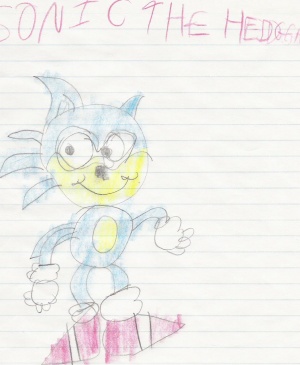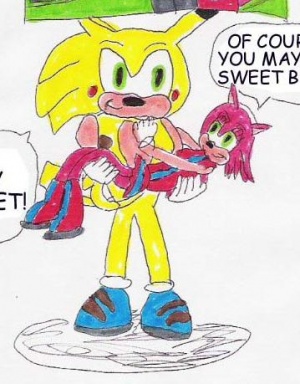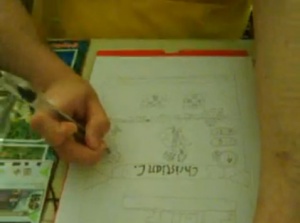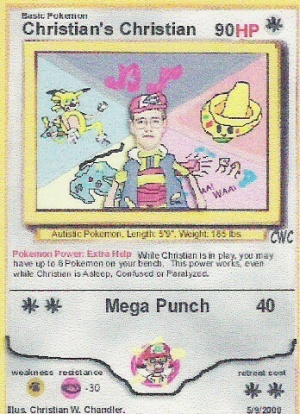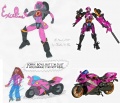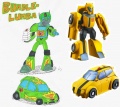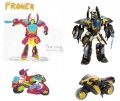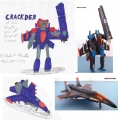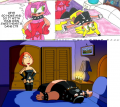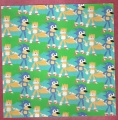Difference between revisions of "Chris and art"
Phlegethon (talk | contribs) m (→Fan Service) |
|||
| Line 84: | Line 84: | ||
===Fan Service=== | ===Fan Service=== | ||
Fan service is a term used to describe something that is meant to tease or please the audience. Fan service could be a cameo or a shout out in a TV show or a comic. Most of the time, though, fan service refers to pictures or scenes involving characters in more sensual positions and manner. | [[wikipedia:Fan service|Fan service]] is a term used to describe something that is meant to tease or please the audience. Fan service could be a cameo or a shout out in a TV show or a comic. Most of the time, though, fan service refers to pictures or scenes involving characters in more sensual positions and manner. | ||
Before he was discovered by the internet at large, fan service was virtually non-existent in the Sonichu comics. However, after the trolls started attacking Chris and challenging his sexuality, his artwork started to head in to the fan service-y manner. Like his Rule 34 drawings seen below, Chris's understanding of fan service is very flimsy. He ''understands'' that some fan service should be "sexy", but his inability to draw characters with even a basic skeletal system makes them appear even more deformed than usual. Another thing that turns off viewers is Chris's need to shove "china" into everyone's faces. Chris thinks that giving every girl wearing clothes (or at the very least, some sort of underwear) a camel-toe makes them sexy. Instead, it has the opposite effect, as it repulses readers. | Before he was discovered by the internet at large, fan service (even non-sensual kind) was virtually non-existent in the Sonichu comics. However, after the trolls started attacking Chris and challenging his sexuality, his artwork started to head in to the fan service-y manner. | ||
Like his Rule 34 drawings seen below, Chris's understanding of fan service is very flimsy. He ''understands'' that some fan service should be "sexy", but his inability to draw characters with even a basic skeletal system makes them appear even more deformed than usual. Another thing that turns off viewers is Chris's need to shove "china" into everyone's faces. Chris thinks that giving every girl wearing clothes (or at the very least, some sort of underwear) a camel-toe makes them sexy. Instead, it has the opposite effect, as it repulses readers. Any attempts to add "sexy" material come across as Chris's own wish-fulfillment, and not as attempts by Chris to think of what other people would like to see in the comic. | |||
Fan service works also usually usually avoiding overt sexuality, because they attempt to make sure the fan service works within the artwork's own boundaries. For example, if fangirls demand sexy pictures from a teen-oriented comic, the worst thing the comic artists do is rip off the hero's shirt, ''while'' the hero is having an epic battle with the nemesis, or something along those lines. Chris completely disregards the target age groups by putting explicit sex scenes in an allegedly kid-targeted comic, and the sexual material also makes little sense as far as the plot is concerned. | |||
== Chris and the industry == | == Chris and the industry == | ||
Revision as of 07:51, 8 May 2010
Art has been, and always will be, Chris's selling point. From the very day "Jason Kendrick Howell" found out about Chris and his creation of Sonichu to today, many people have been drawn (no pun intended) to Chris because of his infamous work. To this day, many people wish to see more of it and will go to extreme measures to get him to work more.
When faced with Chris, most people will undoubtedly ask, "is there any field of endeavor that he doesn't completely suck? Is there any field where he has shown any improvement at all?" One could argue that he has, in fact, gotten slightly better over the years. There's no question about it; the early Sonichu comics are noticeably worse than the newer ones. However, we must remember that he wasn't any good to begin with and has barely gotten any better in spite of years of practice. Chris's drawings still remain disproportionate, child-like, unimaginative and hilarious. GodJesus bless his little autistic heart.
The sad part is, this is the closest Chris has to an actual "skill." It's no wonder he's never been able to get and keep a job.
Chris and the medium
Exercise of skills and improvement in craft
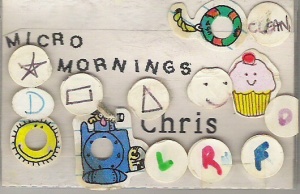
Since Chris first started drawing, his artwork has been abysmal. While it may have improved since the day he first drew Sonic the Hedgehog, there's still considerable room for improvement. Sadly, Chris refuses to improve, thinking that what he's doing now is the shit.
As Chuck Jones said, everyone's got a hundred thousand bad drawings in them. Chris is just too lazy to get them out. Chris fails to understand that even great artists don't get every stroke down on the paper perfectly; he just scribbles down something and thinks that is the best thing he can ever do. Many beginning artists notice immediately that they can't draw worth a damn, and spend quite a lot of time erasing and redrawing. This is perfectly normal. Where Chris fails is not stopping and asking "does this look good?" If the answer is "no," then the obvious solution is to keep trying. In Chris's mind, the answer is always "yes."
Chris does not appear to draw much outside of the comic pages themselves. He almost never shows any pencil sketches (and those only when trolls whip him into releasing them), and never any practice drawings, master copies, anatomy studies, speed sketches, class exercises, scribbles on napkins from restaurants, or anything of that sort; it is easy to question whether or not he does any of the latter sorts at all. When he tried to prove his real identity, he just showed drawings that everyone had seen before, some of which were several years old. Most amateur or professional artists, if put into that situation, would probably flip open their sketchbook and show new stuff they'd just drawn an hour ago. He appears to do at least some pencil sketches before drawing the comic (the hasty release of Sonichu 9 also proves that), but judging from his tutorial video, he doesn't ink the pencilings, he just re-draws everything hastily.
He revealed in a response to an email dated 21 November 2009 that he spends "an hour at most" drawing a comic page and about a half-hour coloring it, "sometimes longer depending on the thought process" (whatever that means). In other words, he invests only a fraction of the time most serious artists put into their work, and it shows. He even offers patently terrible advice to a fan in Mailbag 16, recommending they focus on drawing foreground characters before doing any kind of background. For most comic artists some minimal background is drawn first so the artist can have some sense of dimension and perspective, then foreground and background images are refined simultaneously. Of course, most comic artists don't work with ballpoint pens and crayola markers...
Ultimately, Chris will never improve because he doesn't actually care about his art or his comics. He's not interested in creating art for art's sake, and he doesn't care about the story. Like with his videogame ideas, he considers any idea he comes up with just as valid as anything he actually commits to paper. He only started publicizing his work as a horribly misguided attempt to attract women, and he only continues to work on it because he's convinced he has a large fanbase that's demanding it. And he only cares about that because he thinks that some of his fans are women who might reward him for his skills.
Sometimes, Chris's art skills are only as good as his equipment. He seems to have miraculously lost his ability to make stop-motion animations; just compare The City of Cwicville Tour! and A Sonichu Day. This is because his earlier tool for making animations, the GameBoy Camera, had the function to easily create stop-motion animations, while his webcams don't have that function; he just can't be bothered to learn how to combine digital photos into animations in software, or would find that too much like actual work.
Comic writing and structure
- Main article: Chris and writing
Chris has major problems keeping the story together: the comic is not scripted at all, and he keeps adding details that he doesn't properly explain later in the story. As far as comic structure goes, he also has problems with textwalling and keeping the speech bubbles in comprehensible order.
Choices of materials and technology
Chris seems to be under the delusion that hand-drawn comics are always better than any drawings produced through other means. This can clearly be attributed to only the fact that Chris hates to change what he has already learned. Most artists would usually say that no material is inherently better than any other, all that matters is that in the end, you have aesthetically pleasing end results — or aesthetically unpleasing, if that was the intention.
While it's true that buying fancy pens won't make you a great artist, they certainly help. Chris doesn't believe in decent-quality media. Cheap paper, cheap pens, Crayola Fucking Magic Markers — serious artists would invest a little bit more of thought on these issues as well. Good art pencils do not cost that much more than crappy ones, and are available at wide range of blackness. The lowest-quality papers tend to crinkle (even before you stick them in a scanner) and turn yellow really fast, while even the typical photocopy/laser printer paper avoids that fate. Chris also pinches pennies in the wrong way by partaking in rampant textwalling to "save marker ink;"[1] while great modern artists have occasionally made poignant art by consciously not expending material, most artists probably prefer to use art supplies for their intended purpose. (Duh.)
As seen in CWC - Hand Drawn Original, his sketching set is something no adult would be caught using professionally, and he doesn't even use the most basic of drawing desks or surfaces. His creations come to life via a toy-like sketching kit from Spin Master called Reflecta Sketch (shockingly, not the Strawberry Shortcake kit seen in the link; it's assumed the product bombed and he was one of the few who bought it, thus the lack of a product page from Spin Master), which only allows him to trace on basic letter-sized copy paper, not the large sketching paper most professional artists use. The kit comes with a reflective piece of plastic where an original can be placed to the left and the reflection is used for tracing an outline, allowing Chris the ease of copying other artists' works to use in his general and Rule 34 artwork.
Of course, considering where Chris prioritizes what he gets from his monthly tugboat (i.e., sex toys, My Little Ponys and video games), it's no wonder that a man who buys all his clothing from a Salvation Army that's apparently run by clowns would invest in art supplies that were intended for a third-grader.
The less we say about Chris's use of computers in putting the final touches in his comics, the better - he uses Comic Sans, a font that's almost universally condemned among anyone with any sort of creative talent as overused and ugly.[2][3] Chris appears to have some version of Photoshop at his disposal (as seen in the "Spiderman-fucking Clyde" saga), but as everyone can tell from the results, either he doesn't know how to use it, or he doesn't do very much with it. Obviously if he did he could save his precious marker ink and color his pages via computer, but with his current sworn enemy utilizing this technique for their art to much better effect, it's doubtful Chris will follow.
Chris has shown utter disdain for the use of computers to work on his pages. In one of phone calls to Alec Benson Leary, Chris is quick to denounce the use of tablets and the like, claiming that they don't give the drawings "character" that normal paper and pencil drawings do. In earlier Mailbags, Chris was quick to denounce Asperchu as "blocky and low resolution" because it was drawn with a tablet. What Chris doesn't seem to understand is that it matters not what the medium and the canvas used to draw, but the style of the artist. And seeing as Chris thinks he's the greatest artist since Leonardo Da Vinci, that's saying something. Similar to his strange obsession with hand-drawn art, he also thinks that his web page was awesome because it was made from "notepad scratch". While it is true that WYSIWYG web editors tend to produce cluttered code and thus building sites from scratch is usually considered a laudable goal, it is also true that a lot of web designers use nothing but text editor and can produce far more stylish web templates than Chris; use of text editor isn't the cause to celebrate in itself.
Drawing techniques
Chris has never even learned to hold a pen correctly. Instead of holding the front of the pen with the thumb and forefinger, he draws with his index finger sticking out and bent around the pen.
Even worse, he doesn't have a working drawing process. Well prepared is half done, and most artists spend most of the time in the preparation phase: sketches, sketches, sketches. On the other hand, Chris seems to focus on what is admittedly the most taxing part of drawing: coloring and putting in the final little details. As said above, Chris hastily sketches something or draws outlines, then colors the drawing. The whole point of pencil sketches is that you know beforehand where the ink goes; the idea is to make sure your drawing looks right before you make hard-to-repair mistakes. The whole process of refining the work and whittling out imperfections one by one until you're satisfied with the result is probably something that would cause too much stress. Also, Chris is incapable of drawing simple straight lines or even coloring within his lines 100% of the time.
Visual style and anatomy
Before the comics, Chris at least attempted a style approaching realism for "paintings" (although, on close examination, most are crayon drawings filled in to a ridiculously thorough degree). Most of the results are buried deep in the Scrapbook of Fail and are about as good as you'd imagine: the anatomy is questionable at best, and rarely consistent. Notably, his glasses are drawn as ginormous goggles, and appear to be the same frames he wears today. Around the time he got into Pokémon, he started moving from pseudo-realistic into a style the Internet would be much more familiar with.
Chris started out with a cartoony style for the comic book, in that all the characters had round heads and comparatively small eyes. One trait that has persisted over years is the way he draws smiles (and oh boy, do his characters smile a lot): A smiling mouth that consists of a curved line with two tiny curved lines on the ends. Most children draw smiles this way, but there always will be a day when the kindergarten or 1st-grade school teacher says that this is just not how people draw smiles in the real world. Nowadays, though, Chris is more eager to draw only half of the smiles, which looks a little bit less creepily manchild-like.
Things changed as Chris got into anime, as well as manga, and sought to emulate them to impress his then-current gal-pal, Megan Schroeder. As like many amateur western artists who ape the style without attempting to adapt it, he simply uses the clichés of "anime style": big eyes, speed lines, panty shots and many of the cheesier conventions, along with heads shaped like pentagons. There is no attempt to incorporate, fuse or otherwise adopt manga elements in a creative and original manner; these art elements are simply layered on top of his original "style" with no adjustment. Chris is no Go Nagai, nor has he probably even heard of him.
However, Chris owns at least one book about drawing manga, as seen in My Half of A Whole New World for Kacey. The book in itself covers everything to do with portraying couples. This volume had images of couples in bed making love. Naturally the degree of the scenes isn't that extreme, but the fact that it's in there lends to the explanation as to why Chris might have purchased the book. Whether or not Chris bought it simply to better draw out his delusional fantasies or simply for more material to gawk at during Mass debating isn't known. Either way, the book has taught him nothing since his works are still horrendous mockeries of what cartooning stands for, Western and Eastern styles alike.
Tying in with this, Chris shows no interest in proportion or even basic anatomy. The manga style allows for some artistic license when drawing human beings, but after seeing what Chris does with anatomy, or rather doesn't, it's clear to see his license needs to be revoked. He draws characters as colored-in outlines, and as a result they have no appreciable anatomy or proportion. All his characters are made of lumpy, sexless shapes with crude genitalia attached. For someone who's supposedly a porno connoisseur, Chris doesn't seem to notice there are sexual characteristics that make women attractive beyond boobs, china, and ass; if he does, he's doing a predictably terrible job depicting them. Note the porn Chris rips off, and how he mimics the basic shape of each picture while getting the anatomy (wonky as most of them are) disturbingly out of whack.
When Sonichu is drawn by Chris speeding towards a rescue, he doesn't look like he's rushing to save the day Sonic-style, but instead has the proportions of those over-exaggerated steamroller men that are the hallmark of circa 1960s Yellow Page ads for construction companies. It's easy to see that Chris is copying the original style of Sonic's running based off the old DiC-produced cartoons and the early comics (which Sonic was depicted running in a cartoon-like, spinning-wheel manner), his lack of proportion and lazy manner in which he refuses to show bending legs give the illusion of Sonichu becoming a steamroller.
What's worse is that even though his characters are simple shapes, they aren't even consistent simple shapes. From one drawing to the next, Chris draws his characters (or even himself) differently. Limbs change shape, heads change size, and faces become unrecognizable; it's only by color scheme that we can guess which character is which. If he were even to practice in the slightest degree, anatomy and character design would be more consistent. Beyond his differently-colored eyes and Sonichu medallion, no two Chrises have ever looked alike, or even remotely like the actual Chris, although Sammy comes somewhat closer.
An interesting thing to note is that, if a character is part of the background (and sometimes, even if they aren't), Chris will draw that character either one of two ways: as a simple white silhouette or as a stick figure. The silhouette drawing was a nuance that Chris picked up after watching the anime series Excel Saga (where it was used as part of a metafictional gag), while the stick figure idea was picked up through South Park (which is known for its deliberately unrealistic animation). Interestingly, Rob Liefeld has also used this shorthand, and, as his many "admirers" will point out, it's one of the laziest shortcuts ever, not to mention blatantly obvious in a medium that isn't animated.
Chris's use of color is rather staggering, and it's hard to begin describing it. Because he colors everything with markers, he uses a lot of flat, basic colors, often ones as bright as possible. He often doesn't even try finding natural shades of things, or sometimes even shades that would fit in the drawings at all. Such coloration only makes his drawings appear even more childish.
Character design
- See also Characterization
Despite Chris's colorful cast of characters, many of them rip off designs from existing characters, with Chris making no effort whatsoever to disguise them. His Sonichus tend to follow the same Sonic-type anthropomorphic look of slicked-back quills, and like Sonic, they wear only shoes and gloves. Rosechus, however, vary. Rosechu herself follows Amy Rose's look; Bubbles, Simonla and Angelica follow the SatAM Sonic series and Archie comic series' lack of clothing á la Sally Acorn; and Zapina is the only one with an original (if fairly blob-like) look.
This design failure goes beyond his Electric Hedgehog Pokémon and extends to his humans as well, especially those connected to him. Most of the time, he'll either disguise their faces with a hood or lift designs from characters from other series. Bagget and ScotPalazzo were pulled from characters from Excel Saga. Whenever Chris needed designs for his e-sweethearts' families, he really went off the deep end: Officer Keino, Ivy's father, had his design cribbed off Coach McGuirk of Home Movies and the father and sister of Kacey were ripped off from Guile from Street Fighter and Candice from Pokémon.
Beyond that, he doesn't even bother trying to design better clothing for his characters. Most of them wear stereotypical "basic" clothing and Chris himself wears his usual clown shirts and pants. With the sole exception of Meg-chan, every female that shows up in his comics wears high-heeled dress shoes, probably inspired by the fact that most elder animated female characters tend to wear those types of shoes wherever they go.
Even more telling is that Chris persists with his "gold on the first try" spiel with character designs. Note that most characters evolve over time and that it takes work to perfect a character design. The most telling of this, barring his Sonichus and Rosechus, is Collosal Chan, Chris's super form. It's painfully obvious what Chris was going for: a fusion of himself and Chris-Chan Sonichu in the same vein as Gogeta, Gotenks and Vegetto from Dragonball Z. Instead, as many trolls have pointed out, the resulting character makes him look like a hobo rather than a fusion. Another one that fits this bill are the Sonee and Rosey creatures. Again, it's obvious what Chris was going for: Sonichu and Rosechu as Baby Pokemon, like Pichu, Wynaut, and Azurill. Instead, they look more unnerving than adorable.
Fan Service
Fan service is a term used to describe something that is meant to tease or please the audience. Fan service could be a cameo or a shout out in a TV show or a comic. Most of the time, though, fan service refers to pictures or scenes involving characters in more sensual positions and manner.
Before he was discovered by the internet at large, fan service (even non-sensual kind) was virtually non-existent in the Sonichu comics. However, after the trolls started attacking Chris and challenging his sexuality, his artwork started to head in to the fan service-y manner.
Like his Rule 34 drawings seen below, Chris's understanding of fan service is very flimsy. He understands that some fan service should be "sexy", but his inability to draw characters with even a basic skeletal system makes them appear even more deformed than usual. Another thing that turns off viewers is Chris's need to shove "china" into everyone's faces. Chris thinks that giving every girl wearing clothes (or at the very least, some sort of underwear) a camel-toe makes them sexy. Instead, it has the opposite effect, as it repulses readers. Any attempts to add "sexy" material come across as Chris's own wish-fulfillment, and not as attempts by Chris to think of what other people would like to see in the comic.
Fan service works also usually usually avoiding overt sexuality, because they attempt to make sure the fan service works within the artwork's own boundaries. For example, if fangirls demand sexy pictures from a teen-oriented comic, the worst thing the comic artists do is rip off the hero's shirt, while the hero is having an epic battle with the nemesis, or something along those lines. Chris completely disregards the target age groups by putting explicit sex scenes in an allegedly kid-targeted comic, and the sexual material also makes little sense as far as the plot is concerned.
Chris and the industry
- Main article: Chris and the industry
In the Sonichu Chronicles and Chris's resume, it's revealed that Chris is under the impression that his art isn't just good, but professional quality, and that he aspires to get into the comics and video game business. The résumé reveals his desire to work as an artist for a professional comic company such as Archie Comics or Marvel, creating his Sonichu comics. There is no word on whether or not he actually submitted anything to these companies, or if they replied. It has been demonstrated again and again that Chris has little concept of how the creative industries actually work.
Originality
He has none. Let's leave it at that.
Plagiarism and tracing
- See also: Chris and copyright
Tracing is an art technique where another piece of art, or portions of it, is copied along its outlines. Among legitimate artists, it is little more than a technique for studying drawing styles of existing pieces of work, or for making variations of the artist's own work, but in the Internet, it has regrettably become a road to stardom for many budding artists; among certain people, making a copy of a drawing or parts of it and trying to pass it off as their own is considered a legitimate strategy — at least until someone finds out about it.
From the day Chris drew his Homemade Nintendo Power magazine, it's easy to see that Chris copies what he sees. This easily started with his drawings of Sonic, Mega Man X and the like on there, but it really spiraled out of control with the creation of Sonichu and Rosechu. It's easy to see that, whenever Chris needs an awesome pose or something for a character, he'll usually fall back on what he's seen. This usually means that he'll take a piece of artwork and change it to his own needs. For example, Rosechu's nudes in Episode 17 are actually tracings of Sonic, Transformers and Family Guy porn, as seen below.
Even more so, Chris isn't above stealing and even altering others' work just to make it his own. Sonichu's easily a given, but it's really evident when he steals from his TRUE and HONEST fans and sweethearts. Megagi, Jiggliami and Layla were taken from, respectively, Megan, Blanca and Ivy after they abandoned him. The character of Simonla Rosechu was created when Chris took a character Evan created, Simonchu, and slapped breasts and a china on it. Chris frequently didn't credit original artists when posting fan art to deviantART, and the CWCipedia fan art page had no credits whatsoever, apart of a brief mention of PandaHalo. Yet, in the not-so-unlikely opposite case, if one were to steal Sonichu, there'd be hell to pay.
But the drawings are still poor!
As Chris's art skills have shown, Chris can't really draw anything well. It is therefore highly surprising that many of his drawings are actually traces. Usually, the biggest tell-tale sign of a tracer is inconsistent drawing style, particularly between works that are demonstrably bad and "original", and high-quality drawings that are strangely reminiscent of other pieces of art. Chris fools everyone by having a very consistent art style — albeit a consistently bad style. Whether this is actually a conscious ploy is debatable, more likely is that Chris fails at tracing, a "technique" even mediocre artists can (and do) employ.
Tools of the Trace
The bad style is explained by the fact that his tracing tools are just as top-notch as his other art tools. Chris uses a toy-like sketching kit from Spin Master called Reflecta Sketch (not quite the same color scheme, but you get the idea), which only allows him to trace on basic letter-sized copy paper, not the large sketching paper most professional artists use. The kit comes with a reflective piece of plastic where an original can be placed to the left and the reflection is used for tracing an outline, allowing Chris the ease of copying other artists' works to use in his general and Rule 34 artwork. This device is why many of Chris' tracings are a mirror image of the original. By comparison, most Internet tracers seem to just use graphics apps, drawing on layers atop original image files. Some of the badness in certain images can be explained by the fact that he's just copying poses and outlines by eye, rather than using any tool for this purpose. Of course, simply tracing poorly doesn't justify wholesale theft.
Traced images from the Sonichu Comic
Rule 34
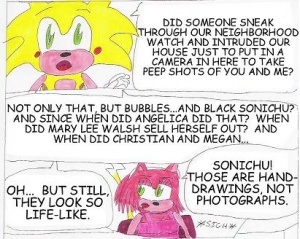
As Chris has no shame, neither do his pictures. Many of his drawings are outright explicit in nature and caused quite a stir with people. Of these pictures, the most damning one of all is the infamous ShecameforCWC.jpg, which brought an end to the Megan Saga and cemented the notion that Chris was an incestuous pedofork. It's these artworks that provoked him to up the age on all of his Sonichus and Rosechus so they can be true, loving couples without any of those messy pedofork undertones.
It still doesn't work, as one of his recent pieces of art ended up getting him tossed out of DeviantArt. Again.
The pictures below are a group of Rule 34s Chris drew for Sonichu 8. As seen in this gallery, Chris can't even copy bad porn to save his life, with Rosechu turning into a deformed monstrosity in each panel, all for the sake of sex. Especially noticeable is the final picture, which shows off a recurring trend in his pictures: the "Glowing Ethereal Cunt of All Ages", in which Chris draws the "cum" from the woman around and outside the vagina instead of from the inside, leading it to have a "glowing" effect.
While all the following images are obviously (bad) Reflecta Sketch tracings of Rule 34 pictures that Chris himself loaded on to his Encycapeeya Dramakka Paysh, it's not clear whether or not all his other porn drawings are also tracings. It's likely that they are, and the source material Chris stole those from is just not as blatantly obvious.
Gallery of traced Rule 34 pictures
| Incredibly horrific and NSFW, this is your last chance to escape with your sanity |
|---|
Gallery of Art
Defending the honor of junk food everywhere!
TL;DR
Chris is an anti-artist.
Sauces
| Chris and... |
|
Body: Drugs • Fashion • Gender • Health • Nutrition • Sex Psyche: Coping • Manipulation • Mental healthcare • Nostalgia • Reality Personality: Anger • Ego • Hypocrisy • Introspection • Kindness • Negligence • Personality • Remorse • Stress Expression: Art • Censorship • English • Language • Music • Oratory • Spanish • Writing Society: Animals • Contests • Death • The Law • Politics • Pornography • Race • Reading • Religion • Sexuality • Socialization • Sports Business: Brand loyalty • Business • Copyright • Money • Negotiation • Work Technology: AI • Cameras • Electronics • The Internet • Science • Television • Video Games |
